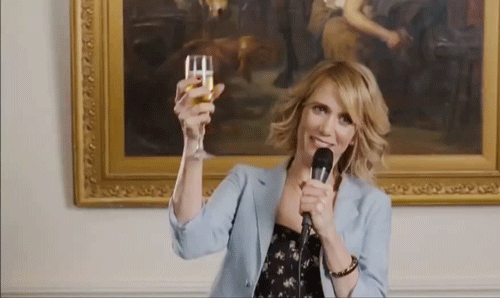Toasts go hand-and-hand with public speaking. They can be nerve-racking and completely overwhelming if you’re not comfortable in the spotlight or speaking in front of others. There are a few keys guidelines that not only help you follow the correct protocol, but help ease your nerves by providing a framework to follow.
Follow these tips to help you impress the next time you have to give a toast.
Tip #1 Choose your speaker wisely:
If you have a say over who will be giving the toast/s then select carefully. There are some traditions typically followed. If it’s a wedding, the best man or maid of honor is usually expected to give a toast, sometime the parents of the bride and groom as well.
However, if it’s your event, you can always feel free to switch things up. If you know your friend is terrified of giving speeches or if you know a certain someone has the tendency to drone on or embarrass you then opt for someone else.
If it’s a dinner or other event usually the host will say a few words. In fact, if you’re the host you should expect to muster up at least a few words to your guests and at the very least introduce the other toast givers.
Tip #2 Take a stand:
With the exception of small or informal dinner parties you’ll want to stand when giving a toast. It’s a way of both announcing that you’re ready to speak and to assure everyone can see you.
Tip #3 Introduce yourself:
If it’s a bigger event be sure to introduce yourself and state your relation to the host, recipient or event topic. For example explain you’re the maid of honor and you knew Jenny since you were both 6 years old. If it’s an event such as a charity, explain how or why you’re involved with the organization. This sets the stage so the audience knows the point of view you’re speaking from. Of course if the host has already introduced you, you don’t have to repeat these details.
Tip #4 Keep it short and sweet:
Unlike other public speeches toasts rarely require you to go on and on. In fact, it’s usually preferable to keep it on the short side. Unless you’re remarkably good at captivating a crowd and wish to share an amusing or heartwarming anecdote it’s usually kinder to both yourself and the audience to keep it succinct and to the point. Of course some occasions require you to go into more detail and in that case it’s fine and even called, but you still want to keep in to 10 minutes and under.
Tip #5 Always get permission:
Never give a toast without first consulting your host. At informal gatherings it’s perfectly fine to say a few words without prior planning (as long as you keep it short and don’t embarrass), but for formal occasions such as black tie dinners, weddings and the like, the host most likely has the event planned down to the last detail so you risk upsetting the timely schedule or stressing the bride and groom or whomever is at the mercy of your words. Always run it by the persons in charge to get the go ahead.
Tip #6 Keep it relevant:
When it comes to what to say always keep it relevant to the event at hand. Consider who or what you’re toasting and the formality of the event. Use language and tone that’s appropriate for the occasion and avoid any words or topics that are controversial or make people uncomfortable. For example if you’re acknowledging someone’s monetary donation to a charity or organization, say “Thank you for the generous donation or contribution” rather than, “Thank you for the money.”
Tip #7 Add some detail:
To show your sincerity, add a little detail to the toast. If you’re thanking someone for a contribution mention exactly what you plan to do with the donation or how the time they’ve contributed has helped. If you’re honoring someone’s achievement, explain why what they did is so impressive. Share the exact number of goals they made or how many hours must have gone into their PHD. This not only makes the recipient feel special, but it makes you look thoughtful and helps guests appreciate more deeply why they’re all gathered in the first place.
Another good tip is to reference some other guests in the crowd. Comment on an impressive dance move or amusing moment they also shared with the guest of honor. It helps to lighten the mood and make it feel more inclusive and intereactive.
Tip #8 Who to address:
You may be toasting a specific person, but remember you’re speaking about them rather than to them. So always use the third-person when addressing them. For example, “Jason is a wonderful tennis player” not “Jason you are a wonderful tennis player.” You can throw in a sentence here and there directed personally to the recipient, but in in general keep the toast about them.
This also goes hand and hand with where to direct your gaze. Although you definitely want to look at the guest of honor you’ll also want to glance around at the rest of the audience. After all you’re making a speech for all to listen.
Tip #9 Forgo the cue cards:
Another benefit of keeping it short is you also omit the need for cue cards. While if you’re giving a longer detailed toast cue cards may be a necessity it always looks more elegant and natural if you simple say what you need to say without looking like you’re reading a school report. That’s why it’s so helpful to memorize the few key points of what you want to say and practice, practice, practice. Then by the time you’re ready to speak you can say what you want while still being in the moment allowing for a polished yet natural sounding speech. Which brings us to our next tip…
Tip #10 Practice:
You may think you’re the type to easily ramble off an endearing captivating toast, but as with any public speaking it’s always best to prepare and practice, at the very least have an outline of what you’re going to say.
Tip #11 Dealing with nerves:
If you’re absolutely terrified of giving a toast, but it’s inevitable (aka maid of honor duties) you can always go the super short route. This can literally be three or four sentences, but be sure to make it heartfelt and sincere. And preface the toast by announcing you’re going to keep it short so it’s not an abrupt surprise.
For example. “Hi I’m Liza. I’m going to keep this short, but I want to say that I’m beyond honored to be here for Jenny on her special day. Having known her since we were both 6 years old I can clearly see she has never been happier and has truly met the love of her life in Doug. I wish you both all my love and hope to be part of all your future celebrations. Let’s raise our glasses to Jenny and Doug.”
Whatever you say, muster up all your emotion (or acting ability) to appear sincere and loving. Look at the bride and groom and show some emotion. By doing this, even though brief, your toast will come off as confident and memorable.
One note, if you’re thinking of going the super short route, check to be sure you’re not the only one giving a toast. You don’t want to be the main event and not have enough said to honor the person of the moment.
And remember, it’s not about you. Most people are waiting for you to finish so they can gulp down their drinks or get back to their meal or conversation. So although it’s important that you give your toast thought and attention, relax, it’s not the highlight of the night for 99% of the guests.
Tip #12 Keep humor in check:
Humor is tricky. Yes it can definitely make a toast fun and more enjoyable, but it can be hard to pull off. If you’re going to attempt something humorous try to keep it short. There’s nothing worse than going on and on with what you think is a funny joke or story to end up with a silent room. It’s embarrassing for everyone. If you keep it short, even if the joke flops everyone just moves on.
If you’re going to make an inside joke make sure it’s subtle and doesn’t detract from the speech. You and the recipient may think it funny, but the rest of the audience will only feel temporarily confused or left out.
Tip #13 Look good:
This should go without saying, but if you’re preparing to give a toast give extra thought to your appearance. Make a quick trip to the restroom to do a quick touch up on makeup, check for food in your teeth and be sure your outfit is in place and appropriate.
Tip #14 Wait to sip:
Never take a sip before you know the toast is finished. If you’re unsure you can always take a cue from the toaster, when they sip you sip.
Toasting may come at the end or beginning of an event or meal. If it’s more formal you may notice glasses of champagne being offered or brought to the table. If that’s the case refrain from taking a sip until you see many others doing so as this is often a sign of an impending speech. Of course if it’s pre-dinner drinks or a cocktail party it’s usually safe to start sipping, just glance at other guests to be sure and try to leave some liquid in the glass in case a speech does take place.
Tip #15 It’s ok if you’re not drinking:
If you don’t drink or don’t wish to, you can alternatively toast with juice, soda or another non-alcoholic option. Try your absolute best to avoid toasting with an empty glass or water. Depending on traditions and culture it can even be seen as bad luck to toast with water so it’s best to be prepared with another drink. Of course if you’re in a pinch you can raise an empty glass or water, but just pretend to drink. Never make a scene trying to get a drink solely for a toast.
Tip #16 To clink or not to clink:
If you’re in a small more informal group, such as dinner with friends and family feel free to clink glasses with the people nearest you, (a tradition or even superstition, is that you must look the person in the eye when doing so, follow this advice to be safe). If it’s a larger or more formal setting such as a wedding or black tie dinner party it’s usually better to forgo the clinking and simply give a little raise of your glass before sipping. If someone tries to clink with you, go with the flow, but particularly at hig- end events when expensive crystal is being used you don’t want to run the risk of any breaking glass. In the same vein never bang on your glass with a utensil. To get everyone’s attention simply stand up and give a little raise of your glass to signal your toast is beginning.
Tip #17 Don’t toast yourself:
If you’re on the receiving end of the toast don’t drink to yourself or clap. It may feel awkward, but try your best to sit there and smile graciously as everyone else clinks and cheers. It’s hard to resist the natural urge to join when everyone around you is doing the same thing, but it’s not customary to drink or toast to yourself.
Once the toast is complete it can be a nice gesture, depending on the type of event, to say a few words of thanks to the host. You only have to do this if it feels appropriate and natural. For example, if you’re being honored for an award or contribution of some sort, it can be nice to say a few words of gratitude.
HOMEWORK: Pretend you’ve been asked to give a toast. Write up what you would say and practice out loud as if you actually have to go through with it. If it’s for a real life event even better. It will put some pressure on you to actually prepare and practice!






